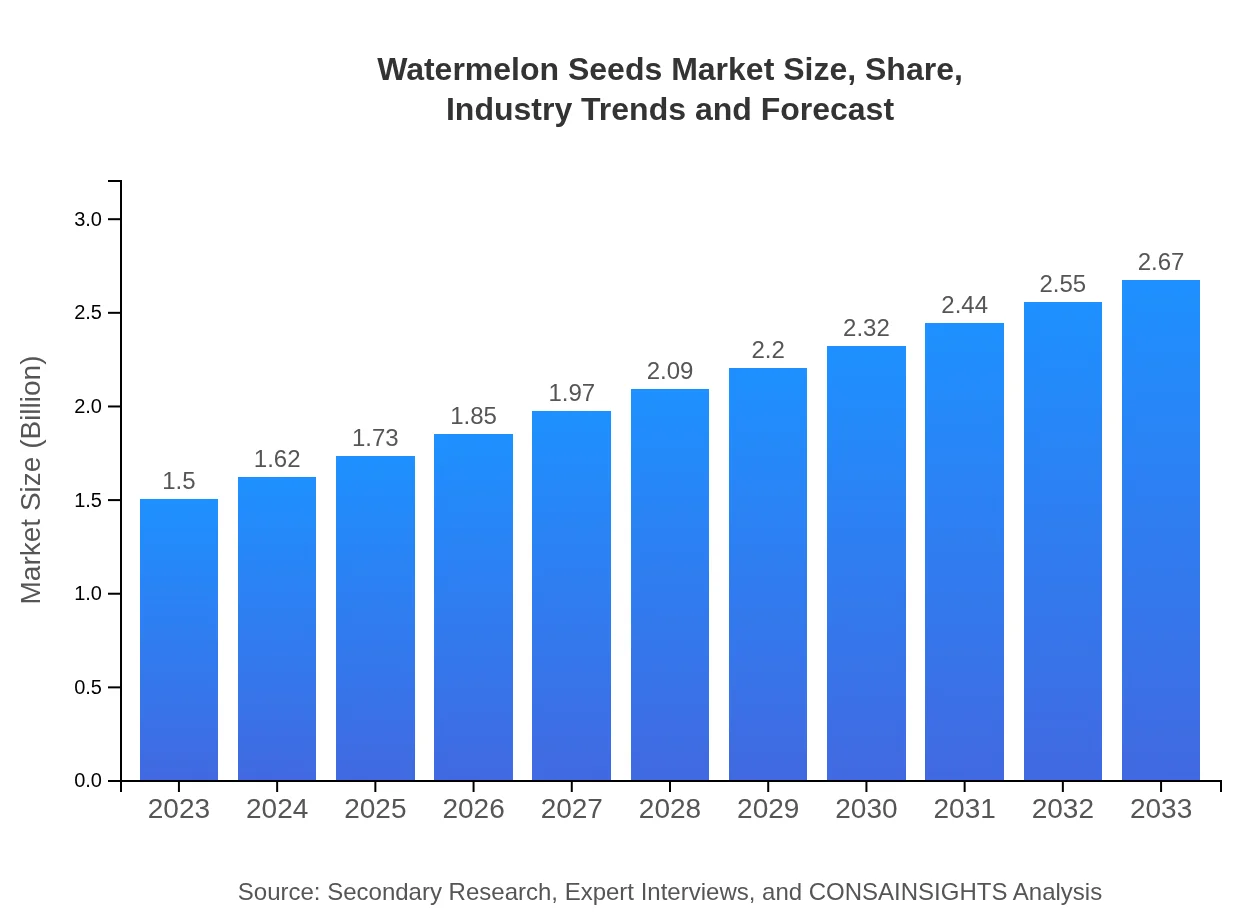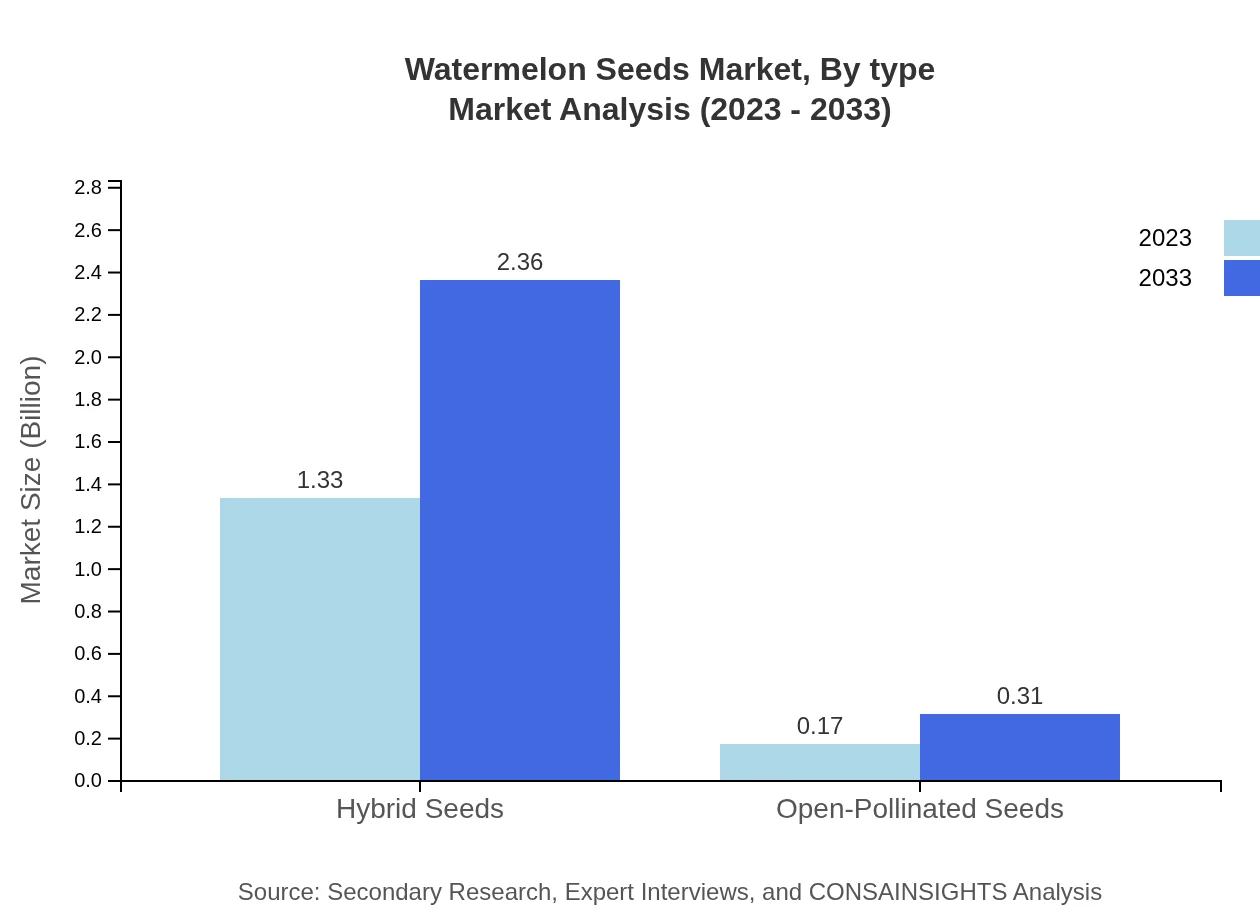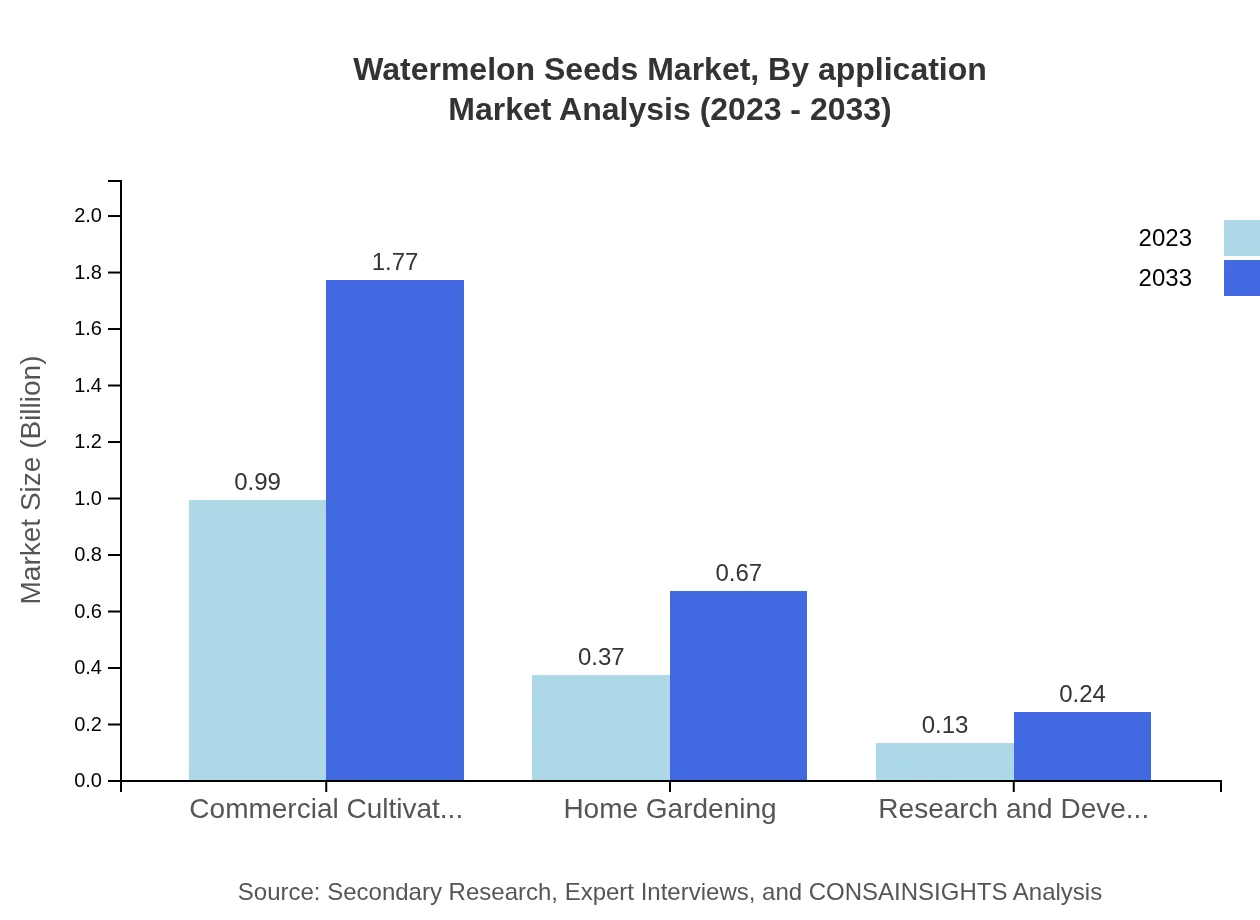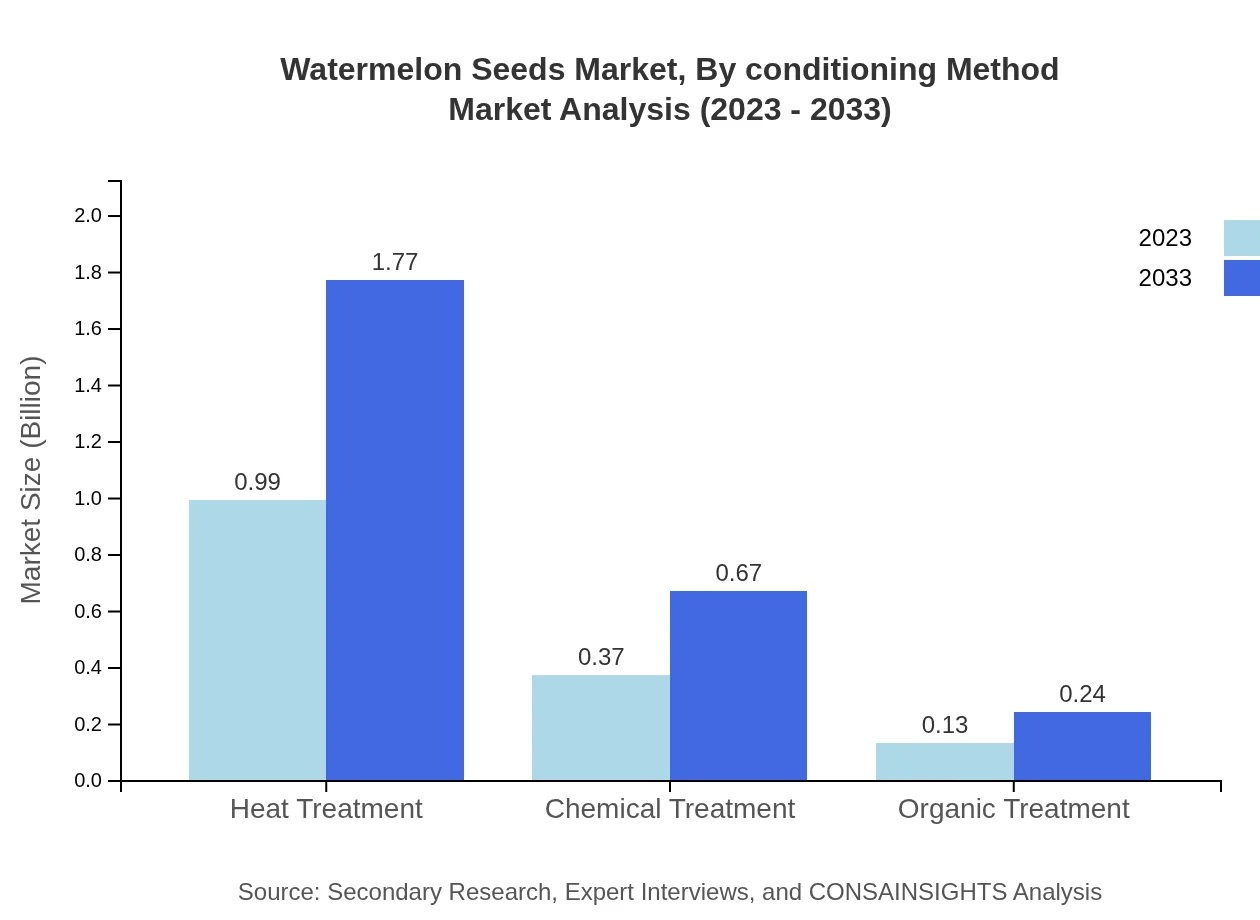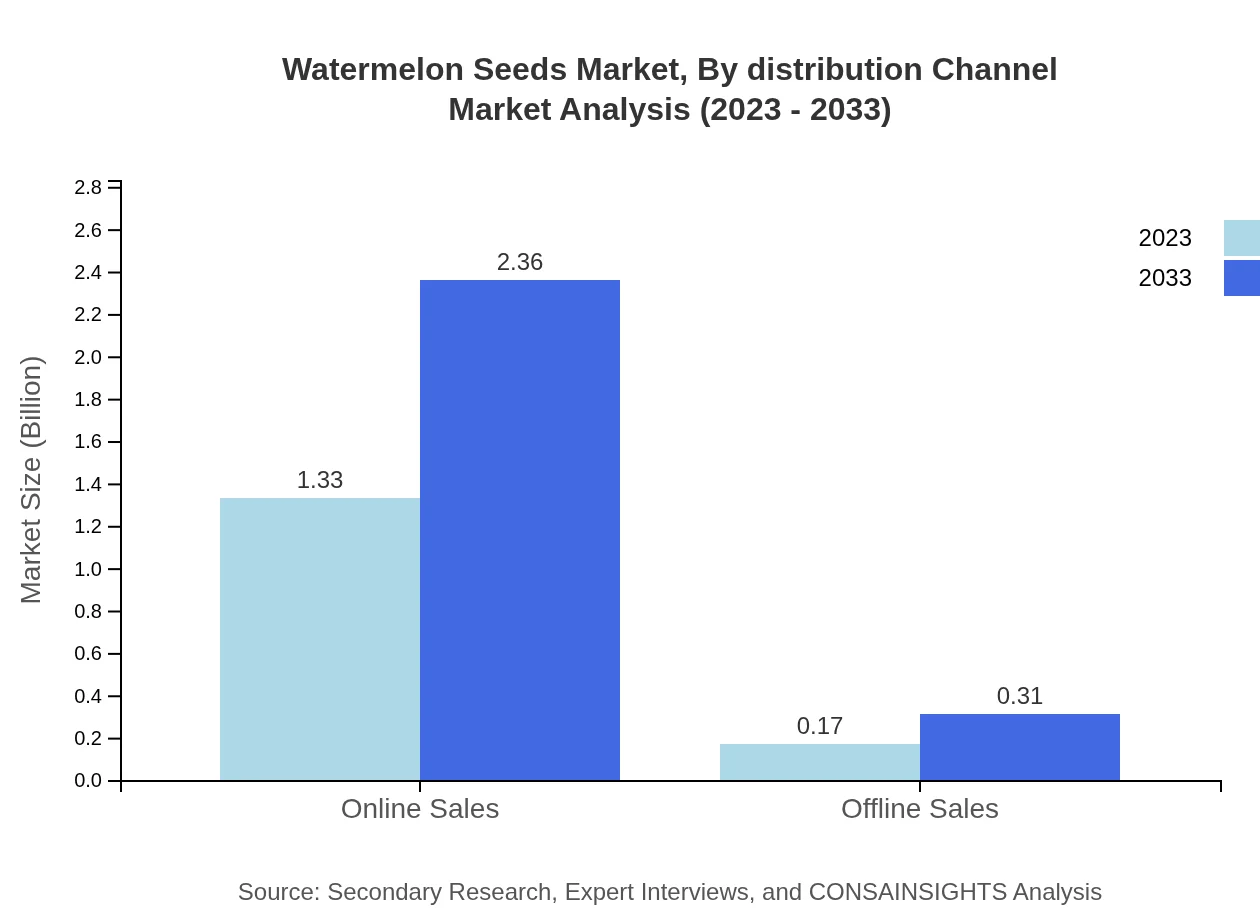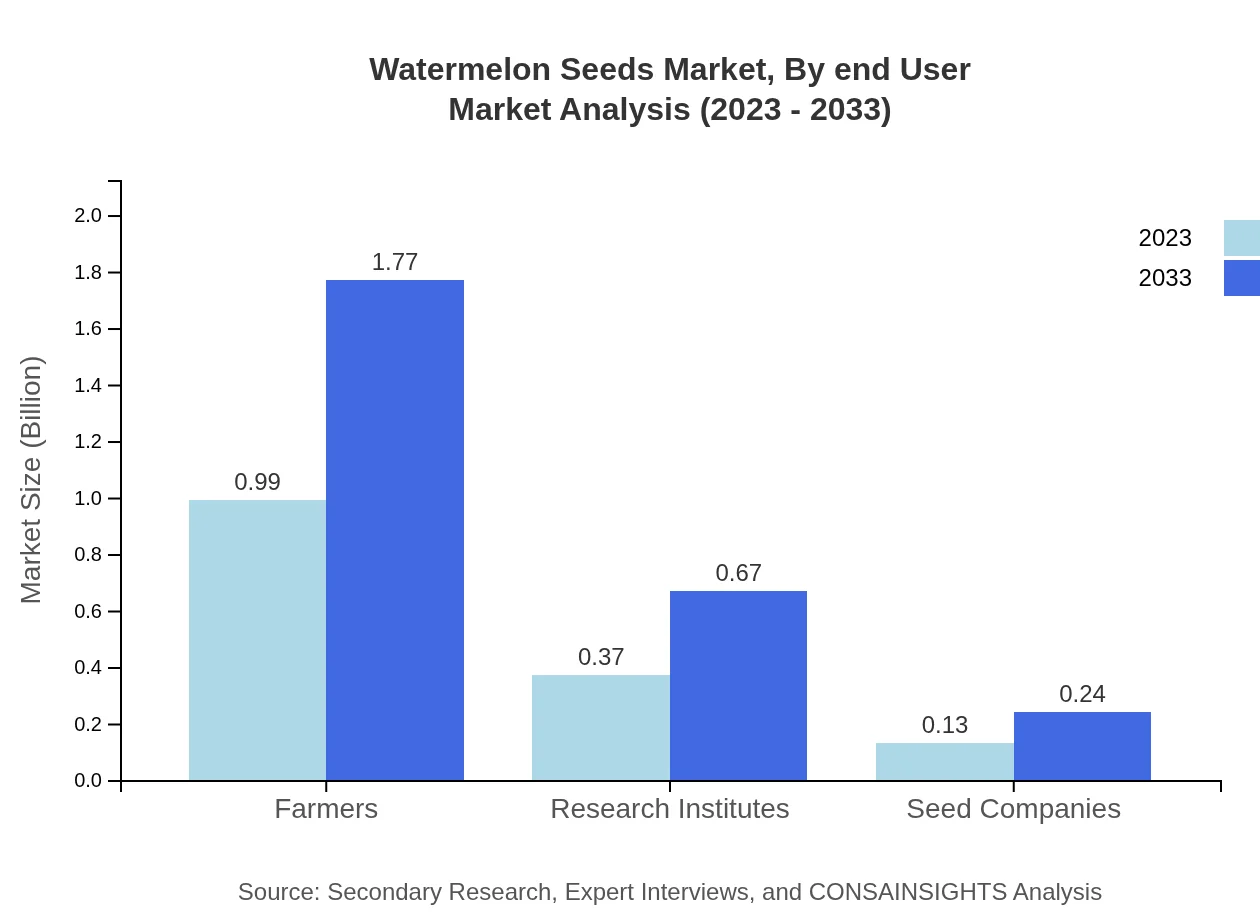Watermelon Seeds Market Report
Published Date: 02 February 2026 | Report Code: watermelon-seeds
Watermelon Seeds Market Size, Share, Industry Trends and Forecast to 2033
This report provides comprehensive insights into the Watermelon Seeds market from 2023 to 2033, analyzing the market size, growth trends, and key drivers while covering regional performances and competitive landscape.
| Metric | Value |
|---|---|
| Study Period | 2023 - 2033 |
| 2023 Market Size | $1.50 Billion |
| CAGR (2023-2033) | 5.8% |
| 2033 Market Size | $2.67 Billion |
| Top Companies | Sakata Seed Corporation, Seminis Vegetable Seeds, Beaufort Seed Company |
| Last Modified Date | 02 February 2026 |
Watermelon Seeds Market Overview
Customize Watermelon Seeds Market Report market research report
- ✔ Get in-depth analysis of Watermelon Seeds market size, growth, and forecasts.
- ✔ Understand Watermelon Seeds's regional dynamics and industry-specific trends.
- ✔ Identify potential applications, end-user demand, and growth segments in Watermelon Seeds
What is the Market Size & CAGR of Watermelon Seeds market in 2023?
Watermelon Seeds Industry Analysis
Watermelon Seeds Market Segmentation and Scope
Tell us your focus area and get a customized research report.
Watermelon Seeds Market Analysis Report by Region
Europe Watermelon Seeds Market Report:
Europe's market is expected to increase from $0.37 billion in 2023 to $0.66 billion by 2033, driven by a shift towards healthier food options and sustainable agricultural practices, leading to increased cultivation of watermelons.Asia Pacific Watermelon Seeds Market Report:
In the Asia Pacific region, the market for watermelon seeds is projected to grow from $0.32 billion in 2023 to $0.57 billion by 2033. This growth is driven by increasing agricultural practices and the rising popularity of watermelon as a dietary staple across Asia.North America Watermelon Seeds Market Report:
North America, particularly the U.S., shows a robust market for watermelon seeds, projected to grow from $0.50 billion in 2023 to $0.88 billion by 2033. High consumer demand for health and wellness products boosts the cultivation of watermelons.South America Watermelon Seeds Market Report:
The South American market is expected to expand from $0.11 billion in 2023 to $0.19 billion in 2033. The region's favorable climatic conditions for cultivation are enhancing seed requirements, making it an emerging market for watermelon seeds.Middle East & Africa Watermelon Seeds Market Report:
In the Middle East and Africa, the market for watermelon seeds is anticipated to rise from $0.21 billion in 2023 to $0.37 billion by 2033, supported by rising urbanization and changing consumption patterns favoring fresh produce.Tell us your focus area and get a customized research report.
Watermelon Seeds Market Analysis By Type
In 2023, hybrid watermelon seeds are projected to dominate the market, valued at $1.33 billion, and expected to reach $2.36 billion by 2033. They account for 88.4% of the total market share. In contrast, open-pollinated seeds have a significantly smaller share, starting at $0.17 billion in 2023 and growing to $0.31 billion by 2033, comprising 11.6% of the market. This suggests a strong inclination toward hybrid varieties among commercial farmers.
Watermelon Seeds Market Analysis By Application
Commercial cultivation of watermelon is the largest segment, contributing $0.99 billion in 2023, projected to grow to $1.77 billion by 2033, reflecting 66.21% of market share. Home gardening and research institutes also hold significant shares at 24.92% and 8.87%, respectively, indicating a diverse application base for watermelon seeds.
Watermelon Seeds Market Analysis By Conditioning Method
The heat treatment method dominates with a market size of $0.99 billion in 2023, expected to reach $1.77 billion by 2033, holding 66.21% of the market share. This method enhances seed viability and yield, making it a preferred choice among farmers. Chemical treatment follows with 24.92% market share and organic treatment is growing, albeit with a share of only 8.87% currently.
Watermelon Seeds Market Analysis By Distribution Channel
Online sales of watermelon seeds represent a growing trend with $1.33 billion in 2023 and expected to reach $2.36 billion by 2033, capturing 88.4% of the market share. Offline sales are comparatively low, starting at $0.17 billion and growing to $0.31 billion, constituting 11.6% of the market. The shift toward digital platforms for purchasing agricultural seeds is reshaping the distribution landscape.
Watermelon Seeds Market Analysis By End User
Farmers represent the largest user segment, with a market size of $0.99 billion in 2023, projected to grow to $1.77 billion by 2033 (66.21% of market share). Research institutes account for 24.92% and seed companies for 8.87%, indicating an ongoing collaboration between agriculture and research for improved seed varieties.
Watermelon Seeds Market Trends and Future Forecast
Tell us your focus area and get a customized research report.
Global Market Leaders and Top Companies in Watermelon Seeds Industry
Sakata Seed Corporation:
A leading player in the seed market, known for its innovative watermelon seed varieties that enhance yield and resistance to diseases.Seminis Vegetable Seeds:
A prominent seed company specializing in hybrid seeds, actively involved in research and development to improve crop varieties.Beaufort Seed Company:
Recognized for its organic watermelon seeds, catering to the rising demand for sustainable agricultural practices.We're grateful to work with incredible clients.









FAQs
What is the market size of Watermelon Seeds?
The global watermelon seeds market is projected to reach 1.5 billion by 2033, growing at a CAGR of 5.8%. This growth is driven by rising demand for hybrid seeds and increased cultivation of watermelon across various regions.
What are the key market players or companies in the Watermelon Seeds industry?
Key players in the watermelon seeds market include major seed companies, research institutes, and commercial cultivators. These entities play essential roles in innovation, breeding, and distribution of both hybrid and open-pollinated watermelon seeds.
What are the primary factors driving the growth in the Watermelon Seeds industry?
The growth in the watermelon seeds industry is driven by several factors including the increasing demand for fresh produce, adoption of hybrid seeds for higher yield, and the rise in home gardening trends. These elements contribute to robust market expansion.
Which region is the fastest Growing in the Watermelon Seeds market?
The Asia Pacific region is expected to be the fastest-growing market for watermelon seeds, with a 2033 market projection of 0.57 billion, up from 0.32 billion in 2023. This growth is fueled by significant agricultural investments and increasing consumer preferences.
Does ConsaInsights provide customized market report data for the Watermelon Seeds industry?
Yes, ConsaInsights offers customized market report data for the watermelon seeds industry. Clients can request tailored insights, specific segment analysis, and regional breakdowns to better understand market dynamics and growth opportunities.
What deliverables can I expect from this Watermelon Seeds market research project?
From the watermelon seeds market research project, you can expect detailed reports that include market size data, growth projections, competitive analysis, regional insights, and segment-wise performance metrics for informed decision-making.
What are the market trends of Watermelon Seeds?
Current market trends in the watermelon seeds industry include an increasing shift towards online sales, the growing popularity of hybrid seeds, and a focus on sustainable agricultural practices. These trends are shaping the future of the market.

